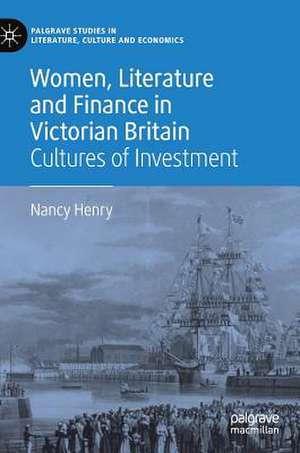Women, Literature and Finance in Victorian Britain: Cultures of Investment: Palgrave Studies in Literature, Culture and Economics
Autor Nancy Henryen Limba Engleză Hardback – 14 sep 2018
| Toate formatele și edițiile | Preț | Express |
|---|---|---|
| Paperback (1) | 638.11 lei 6-8 săpt. | |
| Springer International Publishing – 22 dec 2018 | 638.11 lei 6-8 săpt. | |
| Hardback (1) | 643.48 lei 6-8 săpt. | |
| Springer International Publishing – 14 sep 2018 | 643.48 lei 6-8 săpt. |
Preț: 643.48 lei
Preț vechi: 757.04 lei
-15% Nou
Puncte Express: 965
Preț estimativ în valută:
123.13€ • 128.88$ • 102.48£
123.13€ • 128.88$ • 102.48£
Carte tipărită la comandă
Livrare economică 31 martie-14 aprilie
Preluare comenzi: 021 569.72.76
Specificații
ISBN-13: 9783319943305
ISBN-10: 3319943308
Pagini: 308
Ilustrații: IX, 284 p.
Dimensiuni: 148 x 210 x 19 mm
Greutate: 0.5 kg
Ediția:1st ed. 2018
Editura: Springer International Publishing
Colecția Palgrave Macmillan
Seria Palgrave Studies in Literature, Culture and Economics
Locul publicării:Cham, Switzerland
ISBN-10: 3319943308
Pagini: 308
Ilustrații: IX, 284 p.
Dimensiuni: 148 x 210 x 19 mm
Greutate: 0.5 kg
Ediția:1st ed. 2018
Editura: Springer International Publishing
Colecția Palgrave Macmillan
Seria Palgrave Studies in Literature, Culture and Economics
Locul publicării:Cham, Switzerland
Cuprins
Chapter 1: Introduction.- Chapter 2: Women Investors in Fact.- Chapter 3: Investment Cultures in Dickens, Trollope and Gissing.- Chapter 4: Elizabeth Gaskell: Investment Cultures and Global Contexts.- Chapter 5: George Eliot: Money’s Past and Money’s Future.- Chapter 6: Charlotte Riddell’s Financial Life and Fiction.- Chapter 7: Margaret Oliphant, Women and Money.- Chapter 8: Conclusion.
Recenzii
“Woman, Literature and Finance is an engrossing work and a welcome continuation of Henry’s research interests on the intersection between cultural representation and finance, most notably as co-editor of Victorian Investments: New Perspectives on Finance and Literature (2009). Henry commands a broad swathe of literary and historical sources.” (BAVS Newsletter, Vol. 19 (3), 2019)
“This is a rich and important study. … This book will be of benefit to anyone interested in nineteenth-century gender, authorship, community, or finance.” (Jill Rappoport, Studies in the Novel, Vol. 51 (3), 2019)
“This is a fascinating book, with new material, particularly on Riddell’s and Oliphant’s lives and novels and original critiques of their financial writings as well as those of Gaskell and Eliot.” (Janette Rutterford, Business History Review, Vol. 93 (1), 2019)
“Archival research and close literary readings is one of the great pleasures of the book. … This fascinating and informative new study is a must-read for scholars and students interested in Victorian political economy and women’s writing. The individual-author format of the chapters makes them ideal for assigning in graduate or advanced undergraduate classes, where they will provide invaluable context for, and deepen and enrich, readings of novels treating (often opaque) economic and financial themes.” (Deanna K. Kreisel, Nineteenth-Century Gender Studies, Vol. 15 (2), 2019)
Notă biografică
Nancy Henry is the Nancy Goslee Professor of English at the University of Tennessee, USA. She is the author of George Eliot and the British Empire (2002), The Cambridge Introduction to George Eliot (2008) and The Life of George Eliot (2012) and co-editor of Victorian Investments: New Perspectives on Finance and Literature (2009).
Textul de pe ultima copertă
Women, Literature and Finance in Victorian Britain: Cultures of Investment defines the cultures that emerged in response to the democratization of the stock market in nineteenth-century Britain when investing provided access to financial independence for women. Victorian novels represent those economic networks in realistic detail and are preoccupied with the intertwined economic and affective lives of characters. Analyzing evidence about the lives of real investors together with fictional examples, including case studies of four authors who were also investors, Nancy Henry argues that investing was not just something women did in Victorian Britain; it was a distinctly modern way of thinking about independence, risk, global communities and the future in general.
Caracteristici
Incorporates historical data as well as literary representations Reorients the perspective on the lives of women and the history of capitalism during the Victorian period Examines the experience of women authors as investors in the nineteenth century










